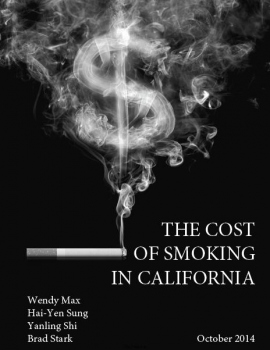
Smoking took an $18.1 billion toll in California – $487 for each resident – and was responsible for more than one in seven deaths in the state, more than from AIDS, influenza, diabetes or many other causes, according to the first comprehensive analysis in more than a decade on the financial and health impacts of tobacco.
While the number of smokers in California declined from a decade ago, and fewer cigarettes were smoked on a daily basis, nearly four million people still smoked, including an estimated 146,000 adolescents, reported the new UC San Francisco study.
The research was conducted at the UCSF School of Nursing’s Institute for Health & Aging. The project was supported by a grant from the Tobacco-Related Disease Research Program of the University of California’s Office of the President.
The study, a snapshot of tobacco use throughout the state, was based on data from 2009, the most recent available when the study began. Similar statewide studies were conducted by the same investigators in 1999 and 1989.

Wendy Max, PhD

Hai-Yen Sung, PhD
“Studying the economic impact of smoking helps us to better understand how tobacco use affects the entire state and allows us to track changes that have occurred over time,” said principal investigator Wendy Max, PhD, professor of health economics at the UCSF School of Nursing and director of the UCSF Institute for Health & Aging.
“We found that while the California tobacco control program has led to reductions in tobacco use in the state over the last decade, smoking is still far too prevalent and results in far too many deaths and high healthcare costs,” she said.
Cigarette smoking is a leading cause of preventable death in the United States, triggering substantial healthcare costs and lost productivity from illness and premature death. The toll extends to nonsmokers exposed to secondhand smoke who also are known to suffer ill health effects and increased mortality.
In the new report, the UCSF researchers profiled the state’s 58 counties with total costs, costs per resident and per smoker, expenditures for each type of health care, smoking prevalence and mortality measures.
Highlights of the report include:
Read the full report.
- The cost of smoking in California amounted to $18.1 billion: $487 per resident and $4,603 per smoker. This included direct healthcare costs and indirect costs from lost productivity due to illness and premature death;
- Among adults who smoked, a majority were “light” smokers who abstained some days or smoked fewer than 10 cigarettes a day (61 percent of women and 59.7 percent of men);
- More adult men than women smoked – 2.4 million (17.2 percent of men) versus 1.4 million (10.1 percent of women). The same was true for adolescent boys and girls, 5.8 percent versus 3.2 percent;
- The cost of smoking was higher for men than women: $11.7 billion compared to $6.4 billion;
- Total costs in 2009 rose by 15 percent compared to the costs in 1999, from $15.8 billion to $18.1 billion; when adjusted for inflation, however, real costs actually decreased by 22 percent between 1999 and 2009.
Altogether, smoking represented $6.8 billion in lost productivity and about 587,000 years of potential life lost from 34,363 deaths, or 17.1 years per death, the researchers found.
